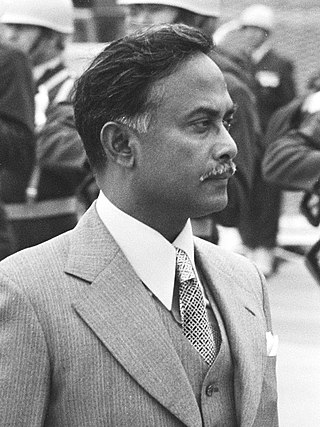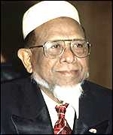Related Research Articles

Sheikh Mujibur Rahman, popularly known by the honorific prefix Bangabandhu was a Bangladeshi politician, revolutionary, statesman, activist and diarist, who is considered the founding leader of Bangladesh. As the leader of Bangladesh, he had held continuous positions either as Bangladesh's president or as its prime minister from April 1971 until his assassination in August 1975. His nationalist ideology, socio-political theories, and political doctrines are collectively known as Mujibism.

Ziaur RahmanBU HJ HOR was a Bangladeshi military officer, freedom fighter and politician who served as the sixth President of Bangladesh from 1977 until his assassination in 1981. He was one of the most influential leaders in the Bangladesh Liberation War, he originally broadcast the Bangladeshi declaration of independence on 27 March from Swadhin Bangla Betar Kendra radio station in Kalurghat, Chattogram. He was the founder of the Bangladesh Nationalist Party (BNP). He previously served as the third chief of army staff from 1975 to 1978 with a minor break.

The Bangladesh Liberation War, also known as the Bangladesh War of Independence and known as the Liberation War in Bangladesh, was an armed conflict sparked by the rise of the Bengali nationalist and self-determination movement in East Pakistan, which resulted in the independence of Bangladesh. The war began when the Pakistani military junta based in West Pakistan—under the orders of Yahya Khan—launched Operation Searchlight against the people of East Pakistan on the night of 25 March 1971, initiating the Bangladesh genocide.

The Independence of Bangladesh was declared on 26 March 1971, celebrated as Independence Day, from Pakistan. The Independence Day of Bangladesh is celebrated on 26 March when Sheikh Mujibur Rahman declared the independence of Bangladesh. The Bangladesh Liberation War started on 26 March and lasted till 16 December 1971 which is celebrated as Victory Day in Bangladesh. There is a dispute along partisan line regarding who declared the independence of Bangladesh. The Awami League claim Sheikh Mujibur Rahman while the Bangladesh Nationalist Party claim it was Ziaur Rahman.

Abdus Samad Azad was a Bangladeshi diplomat and politician. He was elected to Bangladesh's parliament five times from 1970 to 2001. He was also elected Member of Lower Assembly in the Parliament of the then East Pakistan. He became President of the Muslim Student Federation of All - Asam in 1946 and led the Language Movement in 1952.
The Agartala Conspiracy Case was a sedition case in Pakistan during the rule of Ayub Khan against Awami League, brought by the government of Pakistan in 1968 against Sheikh Mujibur Rahman, the then leader of the Awami League and East Pakistan, and 34 other people.
Events from the year 1966 in Pakistan.

Sheikh Mujibur Rahman, the first president of Bangladesh, was assassinated along with most of his family members during the early hours of 15 August 1975 by a group of Bangladesh Army personnel who invaded his residence as part of a coup d'état. The Minister of Commerce, Khondaker Mostaq Ahmad, immediately took control and proclaimed himself head of an interim government from 15 August to 6 November 1975; he was in turn succeeded by Chief Justice Abu Sayem. The assassination marked the first direct military intervention in Bangladesh's civilian administration. Lawrence Lifschultz characterized this incident as an outcome of the Cold War between the United States-influenced Pakistan and the Soviet Union-influenced India. 15 August is annually observed as National Mourning Day, a commemorative day in Bangladesh.
The Bangladesh Liberation War started on 26 March 1971 and ended on 16 December 1971. Some of the major events of the war are listed in the timeline below.

Ataur Rahman Khan was a Bangladeshi lawyer, politician and writer, who served as the chief minister of East Pakistan from 1 September 1956 – March 1958, and as the prime minister of Bangladesh from 30 March 1984 to 1 January 1985.

The independence of Bangladesh was declared on 26 March 1971, at the onset of the Bangladesh Liberation War by Sheikh Mujibur Rahman; the following day the declaration was broadcast by Major Ziaur Rahman from Swadhin Bangla Betar Kendra radio station in Kalurghat, Chattogram. On 10 April, the Provisional Government of Bangladesh issued a proclamation on the basis of the previous declaration and established an interim constitution for the independence movement.

The 7th March Speech of Bangabandhu, or the 7/3 Speech, was a public speech given by Sheikh Mujibur Rahman, the Founding Father of Bangladesh on 7 March 1971 at the Ramna Race Course in Dhaka to a gathering of over one million (1,000,000) people. It was delivered during a period of escalating tensions between East Pakistan and the powerful political and military establishment of West Pakistan. In the speech, Bangabandhu informally declared the independence of Bangladesh, proclaiming: "The struggle this time, is a struggle for our liberty. The struggle this time, is a struggle for our independence." He announced a civil disobedience movement in the province, calling for "every house to turn into a fortress".

The 1969 East Pakistan uprising was a democratic political uprising in East Pakistan. It was led by the students backed by various political parties such as the communist party of East Pakistan, the Awami League and the National Awami Party and their student wings, and the cultural fronts against Muhammad Ayub Khan, the president of Pakistan in protest of the oppressive military rule, political repressions, Agartala Conspiracy Case and the incarceration of Sheikh Mujibur Rahman and other Bengali nationalists.
Aminur Rahman Shamsud Doha was a Bangladeshi politician and former foreign minister of Bangladesh.
Mashiur Rahman (1920–1971) was a Bangladeshi lawyer and politician, a member of the East Bengal Legislative Assembly and cabinet minister in the East Pakistan government of Ataur Rahman Khan. He was instrumental in the founding of the Bangladesh Awami League and in the Bengali Language Movement, and supported Sheikh Mujibur Rahman.
The non-cooperation movement of 1971 was a historical movement in then East Pakistan by the Awami League and the general public against the military government of Pakistan in March of that year. After the announcement of the suspension of the session of the National Assembly of Pakistan on 1 March, the spontaneous movement of the people started, but officially on the call of Sheikh Mujibur Rahman, the non-cooperation movement started on 2 March and continued until 25 March. The movement lasted for a total of 25 days.
Provincial elections were held in East Pakistan on 17 December 1970, ten days after general elections. A total of 1,850 candidates ran for the 300 seats in the East Pakistan Provincial Assembly. The result was a landslide victory for the Awami League, which won 288 of the 300 seats.

The premiership of Sheikh Mujibur Rahman began on January 12 of 1972 when he was sworn in as the Prime Minister of Bangladesh after briefly serving as the President after returning from Pakistan's jail on January 10, 1972. He served as the Prime Minister of Bangladesh until January 25, 1975, for three years, and later led the parliament to adopt an amendment of the constitution that made him the President of Bangladesh, effectively for life.
Khan Shamsur Rahman, also known as Khan Mohammad Shamsur Rahman, was a Bangladeshi diplomat and the first ambassador of Bangladesh to the Soviet Union. He was the High Commissioner of Bangladesh to India.
Rahul Quddus was a former bureaucrat of Bangladesh. He is the first and only secretary general of the Cabinet of Bangladesh and the first Principal Secretary of the Prime Ministers' Office.
References
- ↑ Central Intelligence Agency (1968). Daily Report, Foreign Radio Broadcasts. United States.
{{cite book}}: CS1 maint: location missing publisher (link) - ↑ "Farm Output Brings Prosperity - Doha". Illustrated Weekly of Pakistan. 1966. p. 11.
- ↑ "Secret Documents of Intelligent Branch on Father of the Nation Bangabandhu Sheikh Mujibur Rahman volume-IV (1954-1957)". সংগ্রামের নোটবুক. 22 April 2021. Retrieved 7 January 2022.
- ↑ Ahmad, Borhanuddin (2001). The Recovery of Freedom. Hakkani Publishers. p. 51.
- 1 2 "NewspaperSG - Indian Daily Mail, 20 March 1952". eresources.nlb.gov.sg. Retrieved 7 January 2022.
- ↑ "Bangladesh Police". www.police.gov.bd. Retrieved 7 January 2022.
- 1 2 "Bangladesh's former FM Shamsud Doha dies". Dawn. 10 March 2012. Retrieved 7 January 2022.
- ↑ Agencies (19 August 2018). "From The Past Pages Of Dawn: 1968: Fifty Years Ago: Akram Khan mourned". Dawn. Retrieved 7 January 2022.